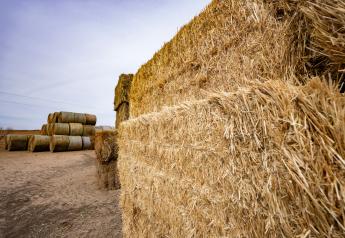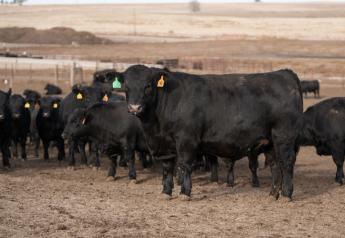Carving Out Answers to How COVID-19 Survives in Meat Processing Plants
USFR 11/07/20 - Farm Journal Report
The scene seven months ago was stark. Some grocery stores housed bare shelves, while others revealed record high retail beef prices. The food scare rattled the country as the COVID-19 pandemic caused panic.
The vivid scene across the country sparked some rapid response research at Kansas State’s Biosecurity Research Institute. From the outside, it looks like a basic building, but it’s a location at Kansas State that houses high-level research with animals, plants and the food system. Now, researchers are trying to carve out answers for COVID-19.
It fits very well within our mission here, to be able to use our containment facilities to start learning about this virus and how it can be transmitted in various environmental situations,” says Dr. Randall Phebus, professor of food safety at Kansas State University.
The research is funded by the U.S. Department of Agriculture (USDA) and the National Institute of Food and Agriculture (NIFA). Phebus and team are researching protection of the meat and poultry processing industry workers.
“In food processing, we have a lot of people in small spaces,” says Phebus. “And not only that, but we have a lot of environmental conditions that are very different.”
From chilled temperatures to ample airflow, the researchers are determined to discover how the virus spreads through processing plants.
“We're going to be looking at how the virus survives and maintains its infectivity throughout the meat and poultry processing facility, and so looking at how disinfectants and cleaners are effective or not effective against the virus, and also how it kind of migrates through the air patterns of a plant to know how long it can survive in that situation,” says Phebus.
Setting out to see if CDC guidelines for other facilities works for meat processors is done in a highly secure lab, and researchers are handling a virus with space-like suits and other protective gear. The research is placing a priority on not only the overall food supply chain, but the essential workforce working in these environments.
“This current pandemic has had such a tremendous impact on the food supply, but also workers’ health, and those workers go back to their families, they go back to their communities,” says Jeanette Thurston, director and professor in the College of Agriculture at K-State.
The research is being done not just in the food science department, but with experts across campus.
“One thing that I’m personally very proud of is this is an interdisciplinary team,” he says. “We have a virologist, we have microbiologist that have worked in safety, we have a risk assessor, all working on trying to understand the virus in these environments, and to be able to identify ways and strategies where we can protect those workers.”
Thurston says the research also has ties beyond campus, with an advisory board of industry representatives to allow this research direct ties to real-time problems.
“For example, identifying the kinds of disinfectants that are typically used, so we can understand whether those disinfectants are effective in reducing the load of this virus in those environments,” says Thurston.
“We're going to be trying to mimic a lot of the meat and poultry processing facilities to actually replicate how the virus spreads and try to make generally generate data to make sure that what we generate can be used by the industry to make sure that the whole food system is safe,” explains Daniel Vega, a fourth-year PhD student working on this research project.
Vega says in searching for answers, there isn’t a model to follow.
“This is a new virus, this is a new pandemic, nobody was expecting this,” he says. “There's really no data. We're lacking a lot of information.
On the surface, the research seems straight-forward, but Vega says the it’s a project that involves many steps.
“Some of those steps related with virus include how we're going create that virus, how we're going to inoculate our surfaces, how we’re going to create the different disinfectants that we're going to use.
The project is funded by an emergency program, meaning USDA wants rapid results.
“We have to understand that our agricultural system is very complex, we have producers, we have feed manufacturers, we have processors, retailers, wholesalers, it becomes very complicated in a pandemic, such as with COVID,” says Phebus. So, part of what we're doing here is understanding how we can minimize that disruption, so that we can keep producing meat and food and other consumer supplies that we need.”
For Vega, it boils down to creating new data the public will trust.
“Making sure that the data we're generating is accurate, and just keep that constant confidence to the consumer,” he says. “I think that's where we need to lay most of our efforts and make sure that what we're generating is good for the for the consumer and for the government.”
By focusing on food defense, the researchers are studying a vital piece of the food supply chain
“I think it's tremendously important from both a public health standpoint, but just ensuring our homeland security,” says Phebus. “If you think back a couple of months ago, and you started seeing shortages of food supply in the grocery stores, that's kind of scary, if you think about it from the standpoint of homeland security. We don't want that to happen in this country.
The research is aiming for rapid results, in hopes of learning more about protein processing problems created by a pandemic and replacing fear with facts.







